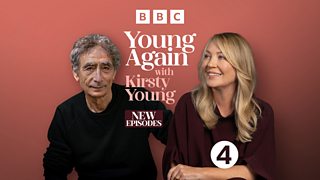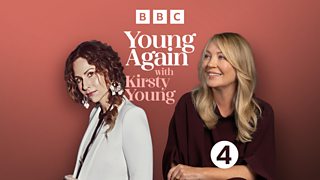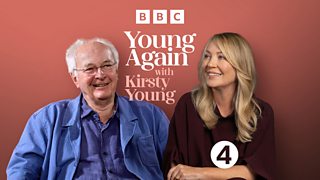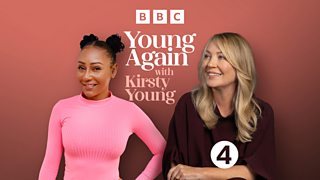Miranda Hart: Seven things we learned when she spoke to Kirsty Young
In her ΒιΆΉΤΌΕΔ Radio 4 podcast Young Again, journalist and broadcaster Kirsty Young asks fascinating people what advice they would like to give their younger self.
Miranda Hart became one of Britain’s biggest comedy stars when her sitcom, Miranda, debuted in 2009. Since it ended in 2015, she’s been largely absent from our screens but has just returned to public life with a new memoir. In a very frank conversation, Miranda tells Kirsty about the illness that has affected her for years and how a proper diagnosis changed her life. Here are seven things we learned.
Young Again: Listen to this episode on ΒιΆΉΤΌΕΔ Sounds
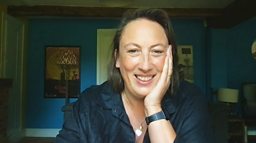
1. A childhood misdiagnosis had huge consequences
For much of her life, Miranda says she has felt “a lot of shame and difficulty about being weak”. Much of that goes back to her childhood, particularly an illness that was wrongly diagnosed and has affected her ever since.
Vulnerable is saying, βI feel terrified right now and I need help.βMiranda Hart
“In a nutshell, it came under the bracket of ME [myalgic encephalomyelitis], a fatigue-based condition caused by misdiagnosed Lyme disease way back when I was a teenager,” she says. “It had wreaked havoc with my immune system.” The condition meant Miranda regularly suffered severe exhaustion, but for decades she was told there was nothing medically wrong. She was only properly diagnosed a few years ago. She felt she “couldn’t share [how I was feeling] without a clear diagnosis. I felt very lost and alone.”
2. Being misunderstood felt like a loss of dignity
Not understanding her own health for years, and not being able to explain it to others, had a profound effect on Miranda. “I felt like I’d lost my dignity,” she says. “Being misunderstood and misjudged and not heard, and having to just carry on on your own, feeling so alone, is so undignified. I learned [writing] the book that having an inherent sense of dignity and feeling loved and listened to is absolutely vital for a human to survive, let alone thrive.”
As a child, she was considered “sickly” and “over-sensitive”, but “wasn’t necessarily surrounded… by people who understood, so I think I had to squash that down… When I got the diagnosis, I predominantly just felt so incredibly sad for that younger self.” She says now she’d tell her, “You are completely brilliant. You are a uniquely wired, inherently loved person.”
3. Sharing is not the same as being vulnerable
“I thought I was quite a vulnerable person,” says Miranda. For a long time, she thought publicly making fun of herself meant she was very open about her feelings.
“Being a comedian, you’re very in touch with that silly side of yourself,” she says. “You just do ridiculous things, like farting publicly and making a joke about it. I was always quite good at sharing – or sometimes over-sharing – with friends. I realised that’s not vulnerable. Vulnerable is saying, ‘I feel terrified right now and I need help.’ Ultimately, I had to get in touch with my feelings to know what I had to be vulnerable about.”
4. Comedy for her is about creating joy
Asked why she went into comedy, Miranda says it began with watching Eric Morecambe. “I saw him when I was eight,” she says. “I saw him playing and mucking about… I remember thinking, ‘I don’t want to be in a world where that sort of silliness and joy and play isn’t there.’ So for me, it wasn’t so much about, I want to get a laugh, or I want to experience that professionally. It was about this inherent instinct, even when I was very young, of how important joy and laughter are. If I could have that every day myself, wonderful. But if I could create it and give it to another, that’s the greatest gift.”
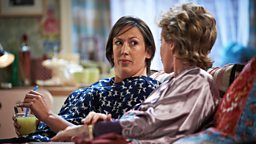
5. She really missed work
Following the end of her eponymous hit sitcom in 2015, Miranda largely stepped back from acting (she had a supporting role in Emma, in 2020). She says it was not by choice. “I couldn’t work because I became ill,” she says. “I tried to keep going before the diagnosis and it didn’t go well… I was so unwell, but I hated having to stop work.”
I now have this brilliant best friend of a man and we laugh every day. Heβs practically more ridiculous than I am, which I never thought possible.
Eventually, there came a point when work was no longer offered. “A few very kindly people occasionally got in touch to go, ‘Just come back when you’re ready.’ But basically the phone stopped ringing and I did feel very isolated and alone. I really, really missed it, because my job can be a family and can be the social life.”
6. She now celebrates her sensitivity
After spending years believing her sensitivity was something to be hidden from people, Miranda now considers it one of her greatest assets. “Now I just celebrate my sensitivity,” she says, ”because it’s where my comedy comes from. It’s where my creativity comes from. If I look at a sunset I’ll cry, and I’m so glad I feel so deeply. It’s really fun with friends and family now that they’ll see me weeping in the corner and say, ‘Oh she’s probably just seen a blackbird hopping or something.’ It’s really fun. It’s just so wholesome and embracing.”
7. She found love in the pandemic
“I have always said, ‘I’ll be fine if I’m single for the rest of my life’, but I don’t think that was true now. I don’t want to be alone,” says Miranda. During the second year of the pandemic, she came to the realisation she didn’t want to be alone anymore. “I think I cried for days, thinking, ‘Wow, I have felt alone.’ But it was beautiful and freeing.” So she decided to start dating.
Happily, she met a man who has since become her husband. “I think if I hadn’t longed and hadn’t felt what I felt then, I wouldn’t have found him,” she says. “It led me to grieve for what I needed and become the person I needed to be to connect. I now have this brilliant best friend of a man and we laugh every day. He’s practically more ridiculous than I am, which I never thought possible.”


